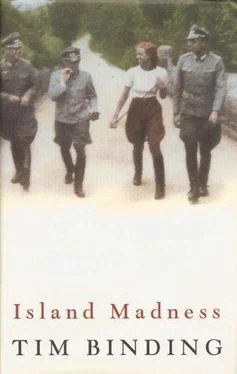“And she wore pigtails in both childhood and…?” He let the word fall.
“For a time.”
“There you are, then. And Isobel, did you ever wish that she might gather her locks and wear them in plaits, like your lady-friends back home?”
Now it was Lentsch’s turn to falter.
“I never imagined such a thing,” he stammered.
“You see! It’s true! You would have preferred pigtails! She was too knowing for you, was that it? Was that what brought her down? That she was too knowing. And here we are the three of us, who brought her such a treacherous gift.”
He took another gulp, choking as he swallowed hard.
“Forgive me. I am not a great conversationalist. I know how to talk, indeed in English and in German and my own native tongue I am somewhat gifted in mastering the technical differences of vocabulary and regulations, you understand. Where I fall down is in the thing that counts, the art of conversation. The words I produce, the manner in which they are delivered, their overall intent and appearance seem to demand the immediate cessation of that of which they seek to be a part, although I find myself unable to understand why.”
“No.”
“I am doing it now, in this very modern and open design, blocking off all avenues of conversation even as I speak.”
“This is not a time for conversation, Mr van Dielen.”
“No. You are right, Mr Luscombe. Ned. May I call you Ned? It is what she called you, after all. I am her father, am I not? Have I not that right too, even though I have been unpardonably rude to you in the past?”
“Thinknothingofit.”
“You said that last night, did you not? When I met you by our front gate?”
“What?” Lentsch looked surprised.
“Did you not know, Major?” Van Dielen delighted in Ned’s discomfiture. “Last night I returned from my dinner with Major Ernst to find the Inspector here scuttling about outside our house like a crab looking for a shell.” He tapped Ned on the knee. “You must be truthful with the Major, Ned, or he will lose his little German temper.”
“This is true?” Lentsch sounded shocked.
“I was walking home late. I thought I saw a light.”
Van Dielen leapt upon the uneasy explanation.
“The light? Yes, I remember.” He stared Ned in the face. He should have been a policeman. “There was no light or I would have seen it too, while taking my farewell of Major Ernst. The only light shining that night was the one burning in your jealous heart.”
He caught Lentsch’s bewildered expression.
“Does not the Major know of that either?”
Ned felt the sand shifting from under his feet. He was being led out of his depth. Now he knew what Isobel had felt like that on that first swim. He tried to scrabble back.
“I saw no reason to tell him right away. It was all in the past. I would have got to it eventually.”
“All in the past?” Van Dielen turned to the Major. “Two summers ago, Major, Isobel was his dream come true and she foolish enough to embrace his advances. A summer of secret love followed, a summer of illicit swimming in treacherous bays, of bicycle rides and furtive little love notes tucked in hidey-holes.” He turned as he heard Ned’s intake of breath. “Oh yes, I know all about those infamous billet-doux.” He swivelled round to the Major again. “But she discarded him. And he did not like that. He felt cheated and wronged and for a whole winter bored the natives with his maudlin tales of his woe.” He leant back on his stool and looked at the two men triumphantly. “At least that is what his uncle told.”
Ned tried to set the record straight.
“It was a summer romance, that was all.”
“For her maybe. But not you,” van Dielen said, rejecting his summary with scorn. “You always entertained the possibility that she might return. Perhaps that is why you were here last night.” He seized on the idea, fascinated with the possibility of embroidery. “Perhaps you had come earlier, to try and plead with her.”
Ned looked down at the floor. His leg was trembling. He pressed his hands on his knees and felt the sweat trickle out under his arms. Van Dielen wriggled in his seat. The prospect of giving no quarter invigorated him.
“Perhaps she tried to send you packing,” he said. “Perhaps you lost your temper. Have you ever thought, Mr Luscombe, Ned, that you yourself could be a suspect?”
“Mr van Dielen!”
“Ah, leave me alone, why don’t you? You’re no use here.”
“As soon as I am able. But there are questions I need to ask.” Lentsch rose on the signal and moving to the drawing room, started flicking through the pages of some old magazines.
“A little clumsily orchestrated,” van Dielen observed. “And quite unnecessary. Well? What is it that we must keep from him?”
“I need to know where she went that Saturday, that’s all,” Ned reassured him. “Can you tell me her movements?”
“I would have thought you knew enough about my daughter’s movements to fill your notebook three times over.”
“Mr van Dielen! You must stop this. It does no good.” Ned spoke to him quietly, though his patience with the man was evaporating fast. Van Dielen closed his eyes, nodding fiercely.
“You are right,” he admitted. “I must stop. It does no good.” He took a deep breath. “Early in the morning she went down to the town to collect her dress from the rehearsal room. She wanted it for the party that night. Later she went for coffee with her aunt. Marjorie telephoned her. ‘Summoned’ was the word Isobel used.”
“When was this?”
“Midmorning? Isobel was put out. She needed to alter her costume. But duty called. She went out. She drank coffee. She came back.” He looked back to the living room where the Major gazed out over the blustery green of the back garden.
“What was she like when she came back?” Ned asked.
“I hardly saw her. As soon as she got back she charged up to her room. I wouldn’t read too much in that,” he added, noting Ned’s interest. “It’s what girls of a certain age do. “Do you want to bring the walls down around our ears?” I called up. Not a word. I presumed she had returned to the strictures of her hemline.”
“And you?”
“I forswore needlework that Saturday. Most of the morning I spent in my study. The dinner with Major Ernst was not only social, you understand. There were important matters concerning the island’s construction programme which needed attention. Isobel and I had a quick lunch of cold meats and beetroot—how I am beginning to loathe that vegetable—and in the afternoon we went down to the old quarter to do some shopping. Then it was on to the yard. I wanted to see the damage the break-in had caused, talk to my foreman.”
“George Poidevin, I take it.”
“Certainly George Poidevin.”
“Did you find much damage?” he asked.
“Judging by George’s rather hysterical ranting over the phone I had assumed half the yard had been laid to waste. As it was there was hardly anything at all, except for George’s precious supply of tea and sugar. You’d have thought they’d stolen the Crown jewels the way he was carrying on. “Don’t worry, George,” I said, “I’ll get you another packet of tea for your little wooden hut,” but the man seemed impervious to my intended generosity.”
“Any cement taken?”
“Not that I know of.” He caught Ned’s look. “Yes, I know what you’re thinking. But even if there was, there’d be no way of identifying it. There’s more bags of cement on this island than there are toffee wrappers.”
Ned returned to the subject of van Dielen’s yard. It puzzled him that Isobel had gone there too.
“A bit odd that, wasn’t it, she going with you? She’d never shown much interest in the yard before, had she?”
Читать дальше












